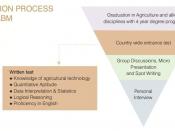One of the most important decisions comes when having to select an employee to fill a job vacancy. In the current labor market, highly qualified applicants are scarce and, among the existent ones, it is hard to spot the ideal candidate. Sometimes it is so urgent that a position be filled, that a person may win the job by default, or sloppy selection criteria may be applied. A "quick fix" may ease workload for a while, but it might prove lethal for the business viability itself in the long run. Therefore, a larger attention in the selection process can provide the business with employees who will finally produce the desired results.
The analysis of the employee selection process is a fairly new practice. During the 70's, any systematic attempt to sort out skills was often unpopular (Lee, 50). This began to change during the 80's and into the 90's, when an estimated 80% to 90% of companies used pre-employment testing (Brindow and Spencer, 80).
As Chris Lee states, "we are returning to a focus on individual competence [â¦] objective standards are coming back in both education and employment" (Lee, 49). Another survey by researchers Randall, Cooke and Smith established that 95% of employers who tried testing for screening sales candidates were still using it (Randall, 53). All the data shows the inclination of the modern businesses to highly stress on everything that will maximize the effectiveness of employee selection and, consequently, employee performance.
Processing an applicant for a job normally entails a series of steps, which are determined by the size of the organization, the types of jobs to be filled or the number of people to be hired. The selection stage should be backed up by an effective recruitment process, which greatly depends on job analysis and job description.
![milano - hotel marriott, 10.02.2009 [SW interview]](https://s.writework.com/uploads/4/47227/milano-hotel-marriott-10-02-2009-sw-interview-thumb.jpg)

